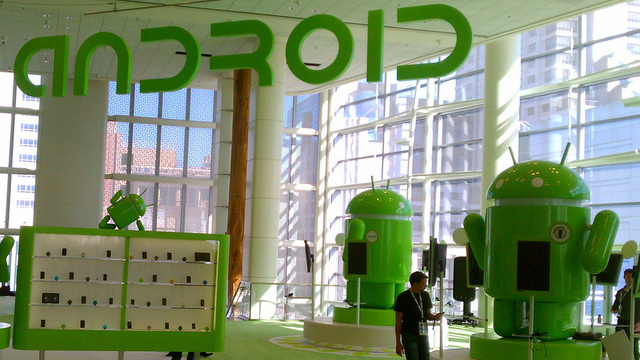
Google’s complaints about patent-based attacks against Android don’t seem to be doing the company any good. We all know Steve Jobs pledged to destroy Android, claiming it stole its ideas from Apple’s iOS. Yet what is likely an even bigger threat comes from Microsoft, which claims that more than half of all Android devices are now subject to patent licensing agreements.
What does that mean? When you buy an Android phone, there’s a good chance either the vendor whose name is on the device or one of the manufacturers who contributed hardware to it is paying Microsoft a fee for each sale. Today, Microsoft announced an agreement with Compal, an original design manufacturer that produces smartphones and tablets for third parties and takes in $28 billion in annual revenue. This was the “tenth license agreement providing coverage under our patent portfolio for Android mobile phones and tablets,” and the ninth in the last four months, Microsoft lawyers Brad Smith and Horacio Gutierrez write in a blog post.
“More important, today’s announcement means that companies accounting for over half of all Android devices have now entered into patent license agreements with Microsoft,” they claim.
According to charts in the blog post, 55 percent of Android devices by worldwide revenue are subject to patent license agreements between Microsoft and original design manufacturers, such as Compal. Moreover, 53 percent of Android smartphones by unit share in the United States are subject to patent license agreements between Microsoft and original equipment manufacturers, such as Samsung and HTC.
In any case, it’s a lot. Some have concluded that Microsoft makes more money from Android than from its own Windows Phones, and HTC reportedly pays Microsoft $5 for each Android phone it sells. Google, meanwhile, distributes Android (at least the smartphone version) as open source software.
Google lashed out at Microsoft and other rivals in a recent blog post called “When patents attack Android,” claiming to be the victim of “a hostile, organized campaign... waged through bogus patents.”
Microsoft didn’t specifically reference that post, but today said “For those who continue to protest that the smartphone patent thicket is too difficult to navigate, it’s past time to wake up.” Microsoft doesn’t just collect money from other companies, it also pays out plenty to protect itself, Microsoft’s legal team notes.
“Over the past decade we’ve spent roughly $4.5 billion to license in patents from other companies,” Microsoft said. “These have given us the opportunity to build on the innovations of others in a responsible manner that respects their IP rights. Equally important, we've stood by our customers and partners with countless agreements that contain the strongest patent indemnification provisions in our industry. These ensure that if our software infringes someone else's patents, we'll address the problem rather than leave it to others.”
Across all types of computing systems, Microsoft has entered into 1,133 agreements to license its patents to other companies. Regarding Android specifically, Microsoft has sued vendors that haven’t paid up, including Motorola, whose mobile division is in the process of being purchased by Google.
You are probably wondering which Microsoft patents have allowed Microsoft to sign up all these vendors to license deals. While all the details of licensing agreements aren’t made public, Microsoft’s Android-related patents have been revealed in lawsuits. Examples include patents related to “implementing both long and short file names in the same file system,” a monitoring system that determines when to erase memory from flash memory devices, and patents related to managing contact databases and meeting requests.
That’s just a sampling, and Android is also subject to litigation from Oracle, which asserts that Android infringes Java-related patents. For all its success with consumers, Android faces a bumpy road ahead in the legal department.
Listing image by Photograph by Brian Cantoni
reader comments
276